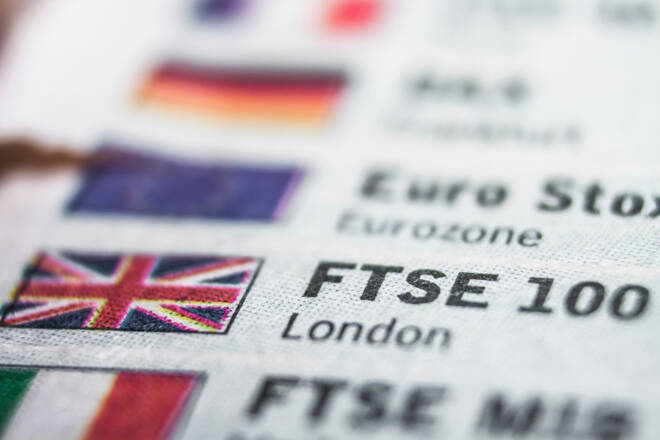Advertisement
Advertisement
DAX Index, FTSE 100, STOXX 600: Europe Healthcare, UK Real Estate Sectors Weigh
By:
Dax Index, FTSE-100 weaker as investors react to uncertainty before ECB & BOE rate decisions, contributing to the near-term bearish sentiment.
Key Points
- Stoxx 600 declines due to healthcare sector (-1.1%), while mining stocks show resilience (+1.4%).
- Barclays maintains a moderate 2024 outlook for European stocks amid expectations of slowing inflation.
- European equities prepare for potential ECB rate cuts, with uncertainty driving near-term bearish sentiment.
European Markets Retreating from Early Week Gains
European markets reversed their earlier gains on Tuesday, with the Stoxx 600 index declining as healthcare sectors led the downturn, dropping 1.1%. In contrast, mining stocks showed resilience, advancing by 1.4%. Notable movements included Swiss tech firm Logitech’s 6.6% fall following a sales dip, and German meal delivery company HelloFresh’s 8.7% rise.
At 12:07 GMT, the broadbased Stoxx 600 is at 471.89, down 0.97 or -0.21%. Germany’s Dax Index is at 16670.66, down 12.70 or -0.08% and the UK’s FTSE is at 7477.42, down 10.29 or -0.14%.
Sectoral Shifts in DAX and Stoxx
In the broader market, HelloFresh led the Stoxx 600, gaining 5.5%, while Banco Comercial Portugues experienced a 6.2% decline. French healthcare giant Sanofi’s shares dipped 2.1% despite its $2.2 billion acquisition of a U.S. drug project.
European Stock Forecast by Barclays
Barclays maintains a positive outlook for European stocks in 2024, predicting moderate returns. This forecast is based on expectations of slowing inflation and potential rate cuts by central banks.
Anticipation Ahead of ECB Meeting
Investor caution prevailed in European equities ahead of the European Central Bank’s (ECB) policy meeting. The market is preparing for potential rate cuts, with a significant reduction anticipated in June. Utilities and real estate sectors witnessed notable declines, while metal miners gained on reports of Chinese market stabilization.
FTSE 100’s Mixed Performance
The UK’s FTSE 100 index saw a halt in its upward trend, with miners like Rio Tinto and Glencore gaining amidst mixed retail sector earnings. Investors are now focusing on upcoming UK economic data to gauge the Bank of England’s policy decisions. The FTSE 250 midcap index also experienced a slight dip after a positive opening.
Short-Term Market Outlook for European Indices
The near-term perspective for European markets leans bearish as the Stoxx 600, FTSE 100, and DAX Index react to monetary policy uncertainty. Recent healthcare sector losses and mixed earnings contribute to cautious investor sentiment, potentially leading to near-term corrections.
Dax Index Technical Analysis
Tuesday’s potential reversal to the downside is worrisome since the Dax Index appears to be in a position to form its fourth lower top since December 14.
The long-term trend, governed by the 200-day moving average at 15907.67 is safe at this time, but the intermediate-term or 50-day moving average at 16414.08 could be treatened if the selling pressure intensifies.
FTSE-100 Index Technical Analysis
Today’s mixed intraday performance is not affecting the main downtrend with the index still holding inside last Wednesday’s huge trading range.
The trend is still down and is going to remain down as long as the FTSE-100 Index remains below the 50- and 200-day moving averages at 7558.14 and 7567.03, respectively.
This suggests that short-covering rallies are likely to be sold until a new support base is built. At this time, the resistance at 7524.87 and the support at 7401.87 are also contributing to the rangebound trade.
Over the short-term, we’re looking for a rangebound trade with heightened volatility.
About the Author
James Hyerczykauthor
James Hyerczyk is a U.S. based seasoned technical analyst and educator with over 40 years of experience in market analysis and trading, specializing in chart patterns and price movement. He is the author of two books on technical analysis and has a background in both futures and stock markets.
Advertisement
